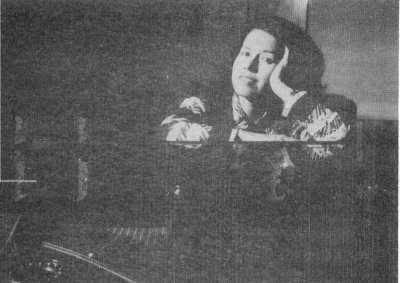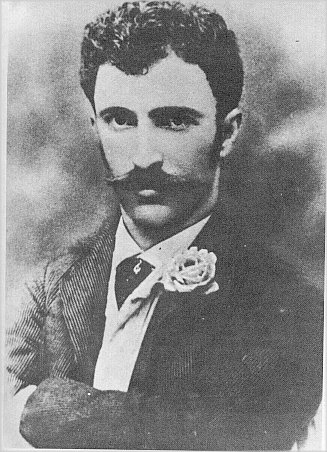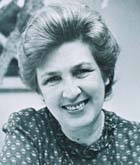

I want you to meet romantic Brazilian composer Alexandre Levy, who lived only 27 years but left important works of very good taste.
While you read about this fantastic musician, listen to the Tango Brasileiro, his most famous work, recovered from an old vynil, as played by the wonderful pianist Eudóxia de Barros:

Thanks to pianist Eudóxia de Barros for allowing me to publish here her recordings of compositions by Alexandre Levy!
Interest in this great composer is justified mainly by the high quality of his output, all in the romantic tradition.
Further, Levy was a pioneer of Brazilian musical nationalism, as shown in the Tango Brasileiro, for piano, and the Suite bresilienne. In spite of the title in French, the fourth part of the suite is a Samba.
He is considered one of the best Brazilian composers of the romantic period. One wonders what could have happened if only he hadn’t died so early and had had the chance to write more music...
Tango Brasileiro was published in 1890 in the newspaper O Diario Popular, “as a gift to our graceful readers”. What does this mean?
In those times – well before women’s suffrage –, all the well-born ladies had a piano at home and were taught to play it. But well beyond these youngens’ delight, the piece is now part of the standard Brazilian repertoire of piano music. Guiomar Novaes, Antonieta Rudge and Eudóxia de Barros are some of the pianists that have recorded it.
(The tango brasileiro as a genre is a Brazilian ballroom dance that was in vogue in Rio de Janeiro in the last decades of the XIX century. It is very different from the tango argentino. Another pianist from those times, Ernesto Nazareth, wrote many famous Brazilian Tangos. Finally, the chorinho genre took over both Nazareth’s music and the tango brasileiro, as if both had always been choro.)
Here is the first page of the score of the Tango Brasileiro.
Levy’s piece is built on the contrast between two themes, the first in A Major, the second in A Minor (0:14-1:19). The last section is in A Major, but the final chord is, surprisingly, of A Minor. This is the opposite of the Picardy third, which Walter Piston explains in his Harmony:
“In the eighteenth century it was almost a mannerism to end on a major tonic triad even though the movement had been unmistakably in minor throughout. This major third was called the tierce de Picardie or Picardy third.”
Can I, then, call Levy’s procedure an anti-Picardy third?
The function of this final surprise is to wrap or synthesize, in a single chord, the entire tension of the piece, as in the most daring romantic fragments.
This elegant and good-humoured piece for piano, opus 1 by Alexandre Levy, was composed between 1881 and 1882. The interpretation is by Eudóxia de Barros.

Alexandre Levy was born in November 10th, 1864. He grew up in a very musical environment. His father, Henrique Luis Levy, owned the Casa Levy, a music store that was very important in the cultural life of the city of São Paulo, Brazil’s largest metropolis. The Casa Levy survives today as a piano store.
Alexandre Levy’s first music teacher was his brother Luis Levy, an excellent pianist and a good composer as well. Later Alexandre studied with Gabriel Giraudon, a French teacher who lived in São Paulo.
French culture must have influenced Alexandre Levy. The family probably used to speak French at home: his father was born French and his mother was from the French part of Switzerland. The composer used to name his works in French.
In 1887 Alexandre went to Europe in order to complete his education. In Paris he studied harmony and counterpoint with Emile Durand, who would also teach Claude Debussy.
Back to São Paulo, Levy composed some masterpieces until his mysterious premature death on January 17th, 1892. He did not suffer from any illness that we know of, but suddenly passed away, leaving an amazing production for a 27 year-old. “An announcement of a genius”, said Mario de Andrade.
An interesting romantic miniature, very quiet, in the tradition of Felix Mendelssohn’s songs without words. Played by Eudóxia de Barros.
Levy’s music took a strong influence from Schumann. But his works are highly original and sometimes built on Brazilian popular forms (the case of the Tango Brasileiro) or use Brazilian folk themes as raw material, which makes him a pioneer of Brazilian musical nationalism.
In fact, even if his art is fundamentally European, Alexandre Levy was classified by Mario de Andrade (perhaps irresponsibly) as a more characteristically Brazilian composer, along with Antonio Carlos Gomes (1836-1896) and Alberto Nepomuceno (1864-1920), than others whose attempts at creating Brazilian music seem more a concession to the exotic, since they couldn’t free themselves enough from European lessons (Leopoldo Miguez (1850-1902), Henrique Oswald (1852-1923), Francisco Braga (1868-1945), João Gomes de Araújo, Barroso Neto (1881-1941) and Glauco Velásquez (1884-1914)).
It cannot be said that Alexandre Levy was the very first composer to use Brazilian popular elements as a thematic basis because in 1857 Antônio Carlos Gomes wrote Cayumba, a negro dance, inspired in folk sources. Another important work which preceded Levy’s was the piano rhapsody A Sertaneja, written in 1869 by diplomat and composer Brasílio Itiberê da Cunha (1848-1913). The song he used was Balaio, from the south of Brazil.
This however does not diminish Alexandre Levy’s historical importance, which is also due to the quality of his compositions.

This important and difficult piano piece, from 1887, reveals how much Levy admired Robert Schumann. The appassionato (passionate) isn’t in the title gratuitously; this is one of Levy’s most romantic pieces.
This haunting performance is by sensational pianist Belkiss Carneiro de Mendonça, who lived in Goiás and passed away in 2005.
Nowadays the Brazilian folk song “Vem cá, Bitu” is better known by its alternative lyrics “Cai, cai, balão”. The first theme with variations ever written on a Brazilian folk song is this interesting piece by Alexandre Levy, with 16 variations.
I intend to write a post about these variations, using Eudóxia de Barros’ recording. Are you interested?